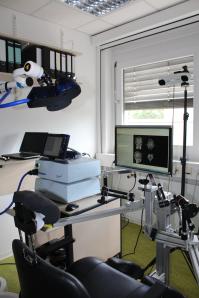
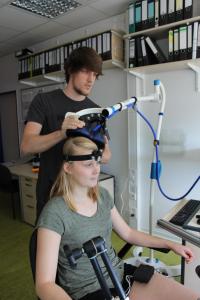
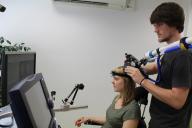
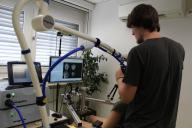




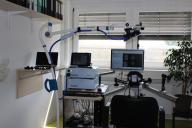
address: Fliednerstraße 21, 3. floor, room: 313 location
During TMS, magnetic pulses are delivered to you via a TMS coil held over a specific brain region. This causes an alteration in the cerebral cortex activity for a limited time span (ranging from seconds to minutes). Depending on the specific type of stimulation, the change may be inhibitory (decreasing activity) or stimulating (increasing activity). In the theta-burst TMS (TBS), a series of pulses are delivered in succession. The advantage of TBS is the relatively short stimulation time (about 40 seconds) with a low intensity (below the threshold of perception). As far as we know, the method is non-invasive, that is, after the stimulation of the neural activity has ceased (maximum 1 hour), no long-term alterations are known to be evident.
TMS / TBS is considered a safe method of examination as long as safety guidelines are followed. On rare occasions jaw pain or headaches may occur for a short time period post-application. However, these pains can easily be alleviated with conventional painkillers.
In rare cases, TBS can cause circulatory collapse. Furthermore, isolated cases have been reported in which individuals had suffered epileptic seizures during stimulation. However, in most cases these individuals had already experienced epileptic symptoms prior to the TMS interaction. In our studies, great care is given to the TMS security guidelines and thus, people who are susceptible to circulatory collapse or epileptic seizures are not permitted to participate.
If, during TMS stimulation, you do not feel comfortable or want to stop the stimulation process, you can do so at any time and without stating reasons.
Individuals who cannot participate in TMS studies are:
People with cardiac pacemaker, ferromagnetic vascular clips, cava filter, cochlear implant, implanted insulin pump, non-removable piercings or metal splinters (if known)